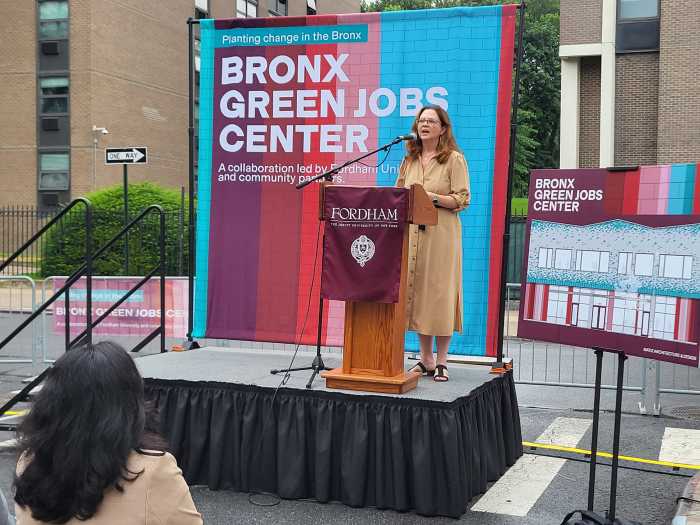The NYC Commission on Human Rights recently won its case in defense of a resident of Parkchester South Condominiums who was threatened with eviction over her service dog.
Michelle Berrios, a nurse practitioner who has lived in her condo for nearly 30 years, started butting heads with management in March 2015 over its ‘no pets’ policy.
A Parkchester security guard wrote her a ticket for owning a toy poodle named Brownie, according to a CHR news release.
Parkchester is a complex of 171 buildings and roughly 12,000 apartments.
Parkchester South Condominium, Inc. owns the buildings in the south and west portion of the complex.
Parkchester Preservation Management, which manages the rental units, agreed to the following terms in a conciliation agreement negotiated with CHR in July 2017:
• Allows Berrios to keep her dog in her apartment.
• Paid Berrios $15,000 in emotional distress damages.
• Paid $81,250 in civil penalties to New York City for willful violations of the NYC Human Rights Law.
• Paid an additional $10,000 for breach of prior settlement agreement in another emotional support animal disability case.
After receiving the violation, Berrios went to the management office to explain that Brownie was an emotional support animal that ameliorates symptoms of her disabilities, including anxiety, migraines, and fibromyalgia.
But days later, Berrios received a notice from management stating she was in violation of her lease for harboring a dog and that if she didn’t resolve the violation, she would be evicted.
The next week, Berrios visited the condo’s offices again to clear up the violation and gave them a doctor’s note.
A management representative again denied her the accommodation and reportedly responded, “We’ll see you in court.”
So, Berrios filed a complaint with the CHR on April 2, 2015, charging PPM and Parkchester South Condominiums with discrimination because of her disability for refusing to grant her an accommodation that allows her to keep her emotional support dog.
Despite exceptions allowing residents to own service or emotional support animals, Parkchester had further restricted its policies illegally, according to the CHR .
“The policies include overly burdensome and intrusive standards governing waivers to its ‘no-dogs’ rule that impede people with disabilities from obtaining reasonable accommodations,” according to Seth Hoy, Human Rights spokesperson.
Management had a narrow and arbitrary list of disabilities upon which they granted accommodations, according to Hoy, requiring tenants to provide a “diagnosis letter” describing how the assistance animals “assist the tenants with activities of daily life,” limiting those activities to physical “self-care tasks” including bathing, showering, dressing, eating, feeding, functional mobility, personal device care, personal hygiene, and toilet hygiene.
That list illegally prohibited tenants with mental disabilities from obtaining a reasonable accommodation to have a comfort animal.
It is illegal under the NYC Human Rights Law to discriminate against tenants with disabilities, including mental.
The commission amended the initial complaint in February 2016 with additional charges after its investigation uncovered “pattern or practice” discrimination and found that PPM retaliated against Berrios after she requested the accommodation and filed a complaint with the commission.
The CCHR investigation also uncovered additional discriminatory policies that prompted the commission to file additional charges on the city’s behalf for “pattern or practice” violations in February 2016.
Only accepting “diagnosis letters” from a physician and not granting accommodations to tenants with letters from treating clinicians, including psychologists, licensed master social workers, or physician’s assistants, violates the law, according to Hoy.
It is also unlawful to request medical information from tenants beyond what is necessary to grant an accommodation, including how long the physician has been treating the tenant, how long the tenant has been diagnosed with the medical issue, and how long they have had their dog.
Berrios testified that she “was dependent on this dog. She’s all I have. She keeps me relaxed. I take less medicine because of her.”
After management unlawfully denied her request for a reasonable accommodation to keep her dog, she told the commission she was physically ill and suffered heart palpitations. She said she didn’t know how she could go on without Brownie.
As a result Parkchester management has agreed to make changes to its policies, including:
• tenants asking for an accommodation to keep an emotional support animal will not be required to show that the animal assists with physical tasks such as getting dressed and walking.
• not deny requests because the tenant got an assistance animal before asking for a reasonable accommodation.
• not require people requesting accommodation to provide medical records or information about their disability beyond that which is minimally sufficient to demonstrate the relationship between the disability and the requested accommodation.
• accept notes from a range of health care providers, including treating licensed social workers, as corroboration of the need for reasonable accommodation.
• not require all assistance animals to complete behavioral training. They may require specific animals that have demonstrated behavioral issues to complete training.
• give residents the option of getting a tag for their assistance animal so that Parkchester security can see that the animal is permitted to be in the complex without having to stop the resident, thus diminishing harassment of residents by the security.
• provide notice of the policy to residents and staff by posting the policy in the buildings, on their website, and through mailings.
• have staff trained on the policy and the NYC Human Rights Law.
• change their policies and procedures to pause eviction proceedings based on the presence of an animal in order to allow for time for reasonable accommodation requests to be made and considered.
• be subject to monitoring by the commission. Keep records related to reasonable accommodations and assistance animals and provide them to commission upon request.
• provide notice of these policies to residents and staff by posting policies on their website, in buildings, mailing notices to residents, giving staff notice of policies and training supervisory, security, legal, and resident staff on the policies and the NYC Human Rights Law.
The Bronx Times Reporter attempted to contact Ricky Pizarro, chief operating officer at the management office, for comment, but calls were not returned by press time.





















